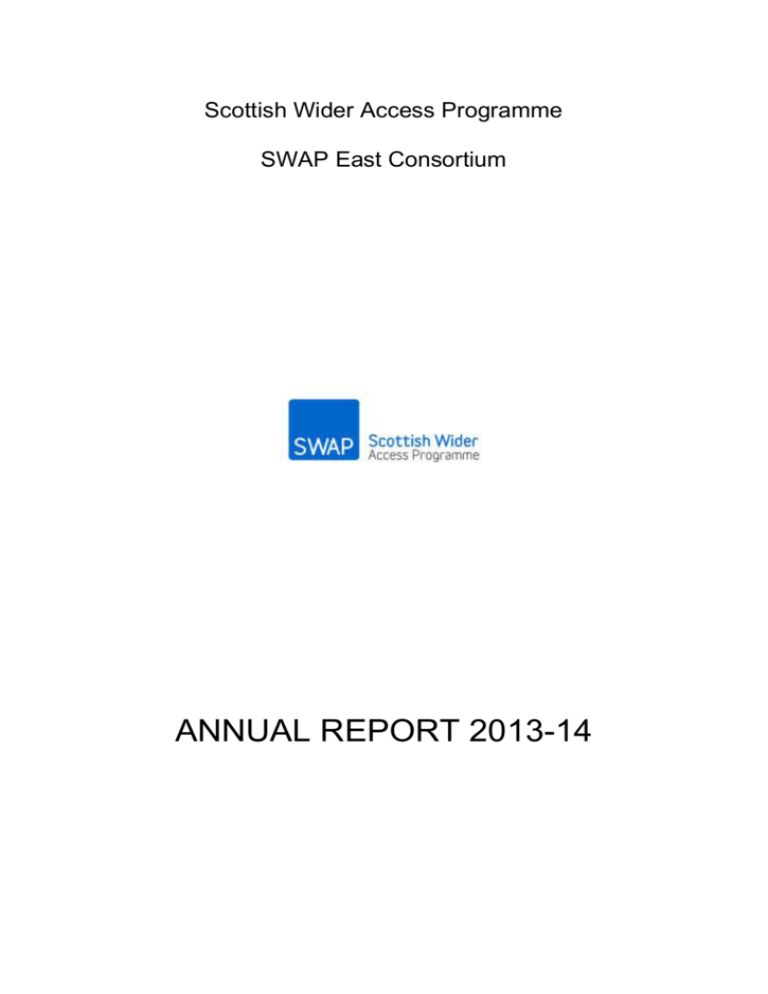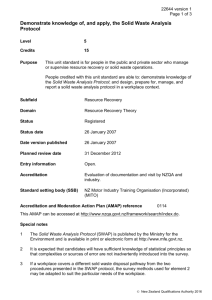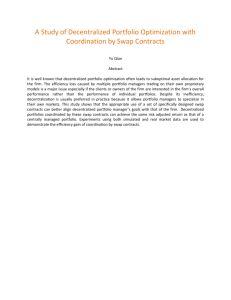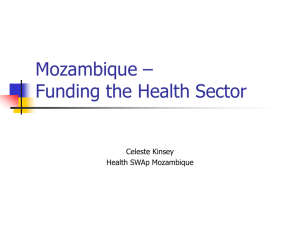swap_east_annual_report_2013_2014
advertisement

Scottish Wider Access Programme SWAP East Consortium ANNUAL REPORT 2013-14 Achievement and Performance There were 27 programmes in Access to Humanities, Science, Engineering and Nursing offered by colleges in 2013-14 running in the SWAP East region. The number of enrolments has dropped again, mainly due to lower numbers in some classes and Edinburgh College’s decision to withdraw their Access to Nursing course as a SWAP programme. Because of this drop in numbers, the targeted number of 1400 for SWAP, in line with the SFC agreement, between the West and East, was not met. The figures for SWAP East are 439 and for SWAP West 926 (total 1365). From the 439 students, 309 passed the course (70%) (71% passed last year). The Humanities pass rate remained approximately the same as in previous years (70%). In the Nursing area there was a significant rise (from 75% to 91%) whilst the Science area showed a steady 67% pass rate. Of these successful completers, 91% progressed onto higher education (as compared with 88% last year and 86% the year before that. Progression to universities rose to 77% (70% and 72% in the previous two last years). Because SWAP East is now a UCAS school, more precise, final data on students who gain a place at university is now available. The figure of 91% moving on to HE may rise further as SWAP is currently tracking students who successfully completed their access course but who did not meet the grades required to enter university. They may have decided, instead, to progress to HND study. SWAP East monitors success using a broad range of widening participation indicators. 1 2 3 4 5 6 Scottish Index of Multiple Deprivation - 18% (23% last year) of intake came from the most deprived communities (SIMD level 1, 20% most deprived areas of Scotland) in Scotland of whom 60% successfully completed (68% last year). The target of MD20 enrolments that the Scottish Funding Council seeks is 24%. SWAP’s national figure for students with a SIMD post code is 34%. If we include the MD40 figures, the %age of enrolment figure for SWAP East rises to 45% of total. 66% of these students within MD40 successfully completed. The number of students who had no family history of higher education (excluding students’ own children) who successfully completed was 163 (53% of total intake) 299 students with no prior qualifications at SCQF level 6 enrolled (68% of total intake). 65% successfully completed the course. Target is 55% The Gender division remains identical as last year (72:28 female/male). The number of students with disclosed disabilities is 15%. This remains above the target set of 12%. SWAP East must continue to work with its partner colleges to increase the numbers of SWAP students. Early indications for 2014 /15 are that the numbers will remain the same as this year. However talks are underway with SRUC to introduce an Access to Science course in 2015; Edinburgh College have re-introduced their Access to Physical Sciences course for the 14/15 session; Newbattle are offering a new Access to Celtic Studies course. SWAP East will also talk to college partners to investigate the possibilities of increasing the number of Humanities and Sciences courses currently being offered. Talks are also underway with Dundee University to work with their Nursing School to introduce profile grades as part of the conditions of offer. This will help re-engage with Nursing students who are SWAP eligible, but who did not enrol last year as SWAP. SWAP Management Group In October 2013 Liz Lister, the SWAP East Chair, stepped down from the Management group and Michael Bates, Head of Recruitment and Admissions at Heriot Watt University was invited to take over the role. The same month, the SWAP East Director, Kate Davidson, resigned from her post in order to take up a job within UCAS. An extraordinary meeting of the Management Group was held in October and an Acting Director was put in place whilst SWAP underwent a review of its governance and office processes. In June, on completion of the review, the group agreed to the Director’s post being advertised and the new Director was appointed. The partners represented within the consortium are constant however the named representative on the management group remains fluid, with continued changes in the FE sector resulting in different attendees. Nevertheless, there is a continued support from institutions that ensure representatives are sent to meetings and feedback information to their institutions. At the SWAP East Management group meeting in May, the group approved the invitation to UHI to become a partner within the consortium. The Director expresses her thanks to the members of the Group and, particularly, to the Chair for their help and support over the year. SWAP East Review In accordance with agreement with SFC, SWAP underwent a review of its office and governance processes between November 2013 and April 2014. A working group was formed from members of the SWAP West and SWAP East management groups to carry out the review. The review process was completed in April and their recommendations given to the Management group in May. The model that was approved at the May meeting of the Management group (with the proviso of some added detail being made available to the group at the next meeting in November) was that a national group would be created (that would include members from the 2 existing management groups). Its remit would be to oversee certain areas of work, common to both SWAP East and SWAP West such as reporting and accountability to the Scottish Funding Council. It would also oversee the implementation of the recommended model. Curriculum review groups will be put in place for the 4 subject areas of Education, Science, Humanities and Nursing. Work will also be done to streamline office processes. It is envisaged that, for SWAP East, the work required to achieve this implementation will be done throughout 14/15 and 15/16. SFC Funding The Scottish Funding Council continues to support the national programme with the same level of funding guaranteed until July 2016. This length of funding means that there is time for plans and projects to be developed and carried through and gives SWAP assurances that there is continued support and interest from the Scottish government for programmes that support widening participation in education. UCAS Centre The second year of operation for students to apply to UCAS using SWAP East as their centre of application went well. 270 students applied to UCAS, with only two classes who did not use the code and a few other isolated incidents. As a UCAS centre, we are now in a better position to able to start building up important, accurate statistical data on students’ applications and offers of places to universities that we can use for comparing data in future years. This year, however, it can be reported that 93% of students who applied to UCAS using the SWAP code were offered at least one place at a university. Those who did not get offered were largely going for either a specific oversubscribed course, did not use all their choices available or applied to non-progression universities and courses. There is no doubt that students benefitted. The SWAP office was able to monitor the offers made to students and intercede on their behalf to universities if necessary. This proved very beneficial for students (and colleges) and resulted in turning negative to positive outcomes for some students. There are also clear statistics of destinations for students since SWAP is now obtaining the information directly from UCAS statistics on final placings. Colleges and universities have also benefitted from this change. Universities are now receiving the SWAP students’ results for ALL students who applied through UCAS from one point of contact – the SWAP office. Course tutors benefit because they receive from SWAP regular reports on their SWAP students’ offers. There is also no doubt that SWAP will benefit. The data that we will compile on student progression will be based on information on students who are offered unconditional places (previously, the data would have been compiled on information known to the Course Tutor in June, when UCAS offers were still conditional. SWAP will use this information to track the student through their HE journey. Recruitment to Programmes Tutors are seeing a large number of enquiries, but the applicant profile is changing. The strict application of entry criteria (five years out of full-time education if the student has previous qualifications at Highers level) has had an impact on acceptances. In August, most tutors were reporting waiting lists for classes. SWAP worked with colleges who still had places to signpost student enquiries accordingly. Unfortunately some classes, showing full in August, have not optimised their numbers as some students who were accepted did not take up their place in September. Dissemination of good practice The course tutors forum met in June to discuss the year past and the coming year. Discussions centred on the UCAS application system, profile Grades, study skills days, Preparation for HE and SWAP East induction talks. The Education forum met in October but the Academic Advisory Boards, which had lapsed, were not re-started in 13/14. It was decided, instead, that SWAP East would await the outcome of the SWAP review. The SWAP Review proposed that Curriculum Review groups in Education, Science, Humanities and Nursing be set up within the SWAP East consortium to match the working groups in SWAP West. It is envisaged that these CR groups will be established in 2015 and will meet once a year to review academic programmes and progression routes. Database The new national SWAP database was operational in September 2013. This database facilitates the development of on-line registration for students, automatic upload of UCAS data, and interface between colleges and universities for results and tracking purposes, a web based progression route search facility. The on-line registration was used by SWAP East students last year and has been used by both SWAP East and SWAP West students this year. The progression database has also proved extremely effective, with students being able to access progression route possibilities from the SWAP East website even before they apply to college, thereby making them aware, pre-access, the recognised, agreed routes into their chosen university course. SWAP West will follow suit this year and create a similar progression service for their students. Website Work is continuing on the website to ensure that students (current and prospective), tutors, partners and stakeholder organisations find the information that they are looking for. SWAP East and West will work together in 14/15 to look at how we can improve the website as our main communication tool. The number of hits to the SWAP website has risen dramatically in the last 2 years. In 2012, there were 25,879 hits; in 2013 there were 38,915 and for the first 10 months of 2014, 47,000. Some of this increase will be due to our current students using it for enrolling and for looking at the progression service. Current students also use the website to access information on events such as open days, SWAP study skills days and Preparation for HE materials. Marketing SWAP East carried out a marketing campaign from January – April 2014. This included a distribution of flyers to a total of 370 communities, libraries, citizens’ advice bureaux, job centres and other relevant organisations throughout the Borders, Lothians, Fife, Perthshire, Dundee & Angus and Forth Valley regions. SWAP East worked with Dundee and Angus College and Dundee City Council’s Community Learning & Development department to engage with adults interested in returning to learning. 3 events were held at community centres in the Dundee area, but numbers were very disappointing, despite newspaper advertising and an article in their adult learning community newsletter to publicise the events. General advertising for SWAP courses was done in the Metro, the Big Issue and South West Edinburgh’s newsletter. Provided accessible guidance The office continued to provide one-to-one guidance to about 800 enquirers through the office telephone and web e-mail, many on a repeated basis. A significant amount of enquiries are from non-eligible students. Many of our current students also get in touch for guidance and support – often as a result of the induction/UCAS talk that we give to all access students at the start of the year. Study Skills Days SWAP East delivered 4 study skills days with our university partners in November/December 2013. The written feedback from students who attended was very good. Due to the cancellation of the Fife and Tayside Science study skills event last year, it was decided that any Dundee, Perth and Fife student would be invited to attend the Edinburgh Science study skills day instead. This year, Edinburgh University hosted it, with an increase in numbers from 25 to 46 (17 coming from the Fife and Tayside area). The Edinburgh Humanities day was hosted by Edinburgh Napier University. Fife and Tayside students were invited to attend if they preferred to come to Edinburgh and 11 students from Fife College Halbeath chose to do so. 117 attended, as opposed to 89 the previous year. In Dundee, 2 Study Skills days were held at Dundee University. 21 students attended the Humanities day (20 the previous year) and 28 attended the Nursing day (27 the previous year). The numbers attending the Humanities and Nursing Days in Dundee were quite small but the day was considered extremely worthwhile by those who attended. In general, the feedback from the 2013 Study Skills days was excellent and the vast majority of the students who attended fedback that they had benefitted from most if not all of the day’s sessions. The programme was varied with most partner institutions participating at some stage in at least one of the days. Extra sessions from universities’ Nursing and Science academic departments added further value this year. The Study Skills days are considered to be hugely successful and beneficial to students and an extremely important part of the Preparation for HE. Not only students but also college tutors find it well worth the day out of college. Attendance from some colleges remained patchy but the Director and SWAP Co-ordinator continue to promote the importance of these at every opportunity. Thanks go, once again, to the partner HE institutions and the staff who unstintingly provide their time and services to ensure this very important part of preparation for SWAP Access students. Progression Routes The offers made to SWAP students from the partners within the consortium remained generally steady with last year’s figures (in terms of percentages). A small number of students were successful in gaining places in the West of Scotland and English universities. Several of the universities within the partnership increased the number of progression route opportunities for SWAP students. Progression routes for the newly introduced Physical Science and Celtic Studies courses have also increased the possible routes available for SWAP students. UHI will be adding their progression routes in 2015. All these are positive outcomes for SWAP. Staffing The staffing remains at a total of 2.2 FTE. This translates into three members of staff. The Director is full-time and the Co-ordinator and Administrator are both on a 0.6 contract. After the results of the review were presented to the Management group in May, the group agreed that the SWAP East Director’s job should be advertised. The Acting Interim Director was successful in applying for the post. This meant that the new co-ordinator, who had also been acting in an Interim capacity, could be offered a permanent post. Both posts are in place for the duration of the current funding period, until July 2016. Lesley Dunbar Director November 2014




